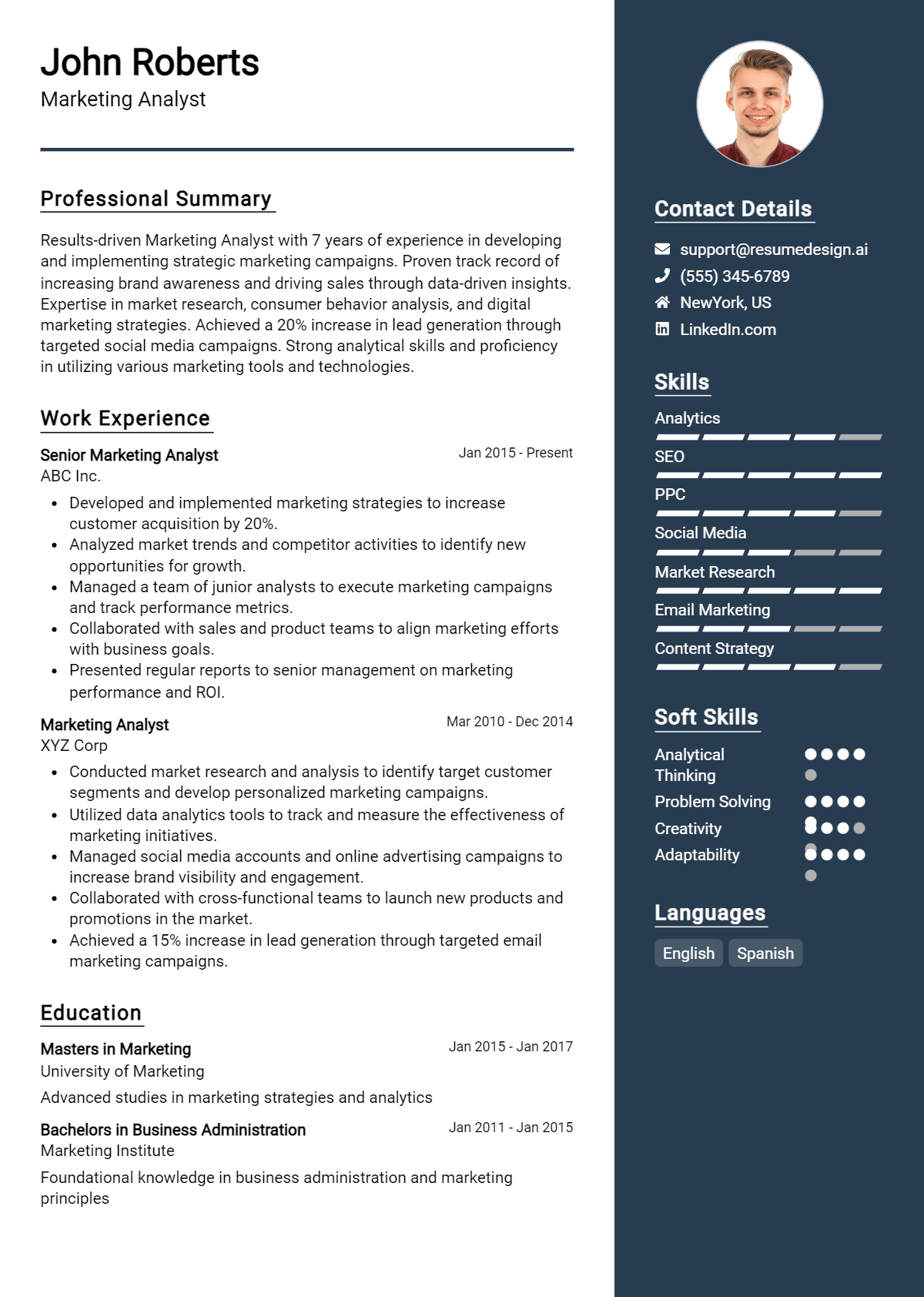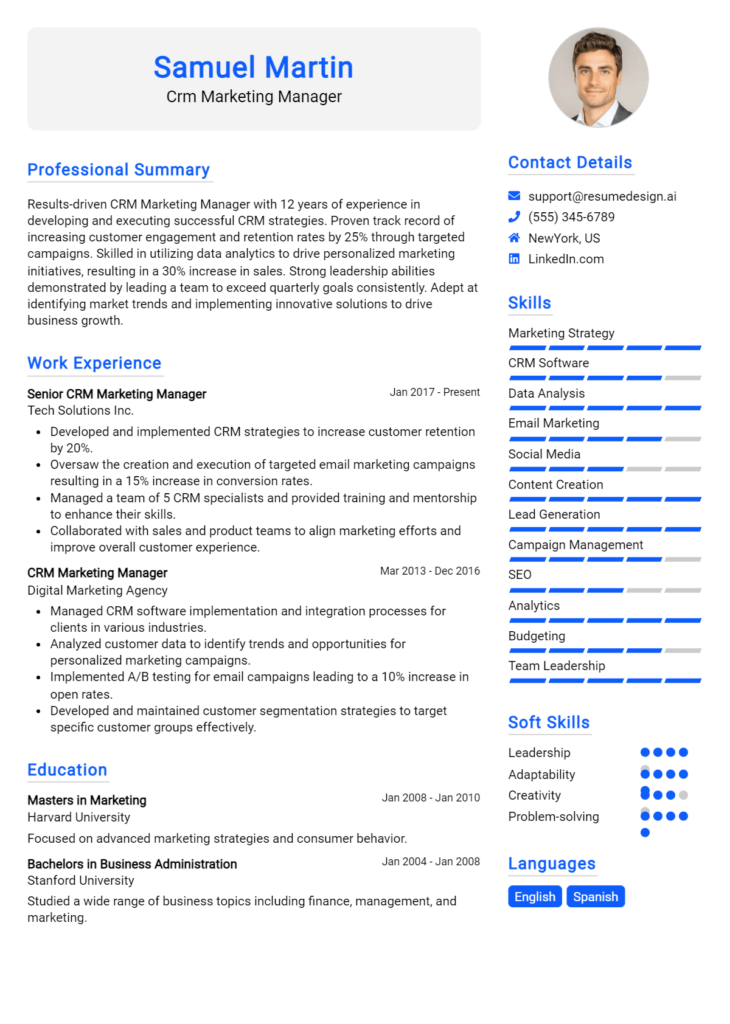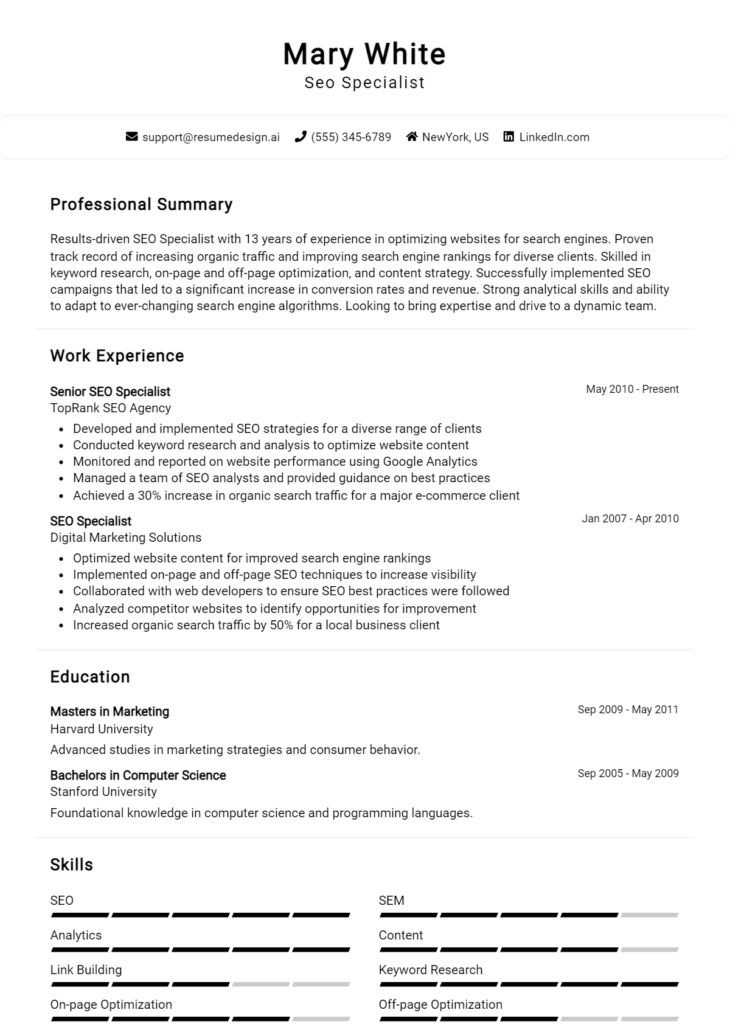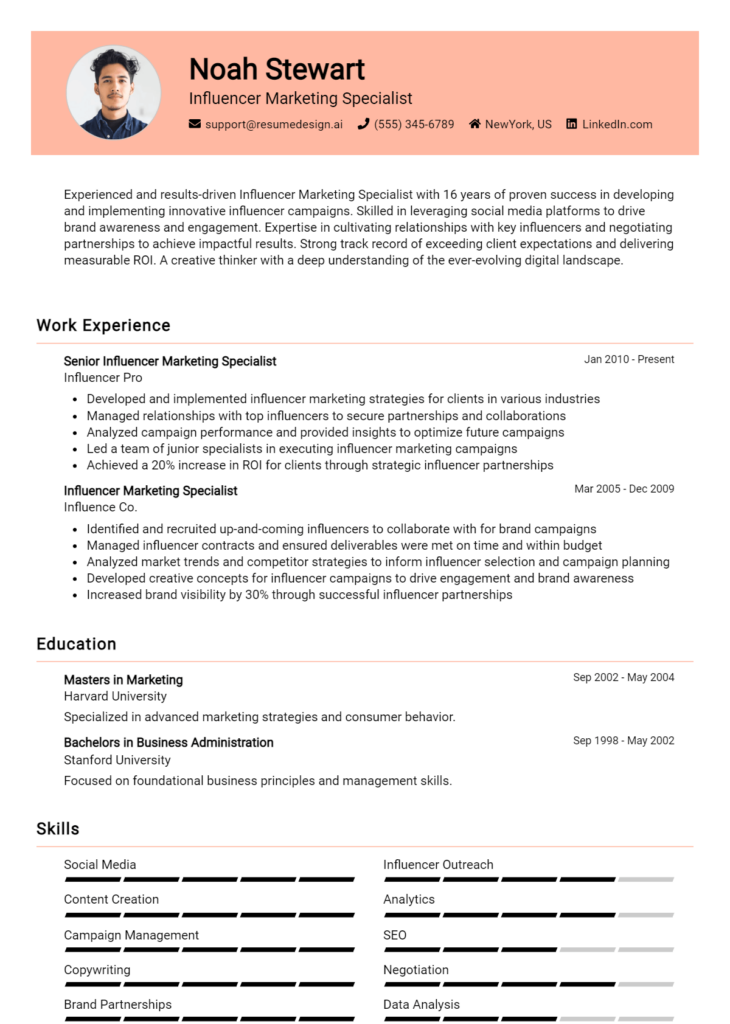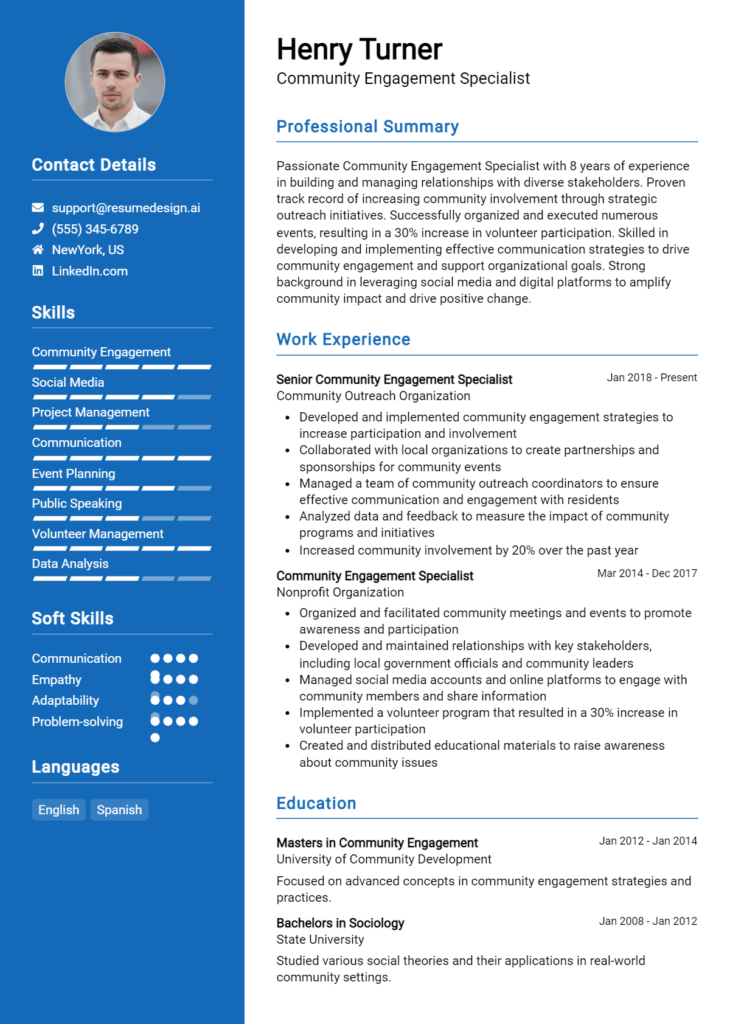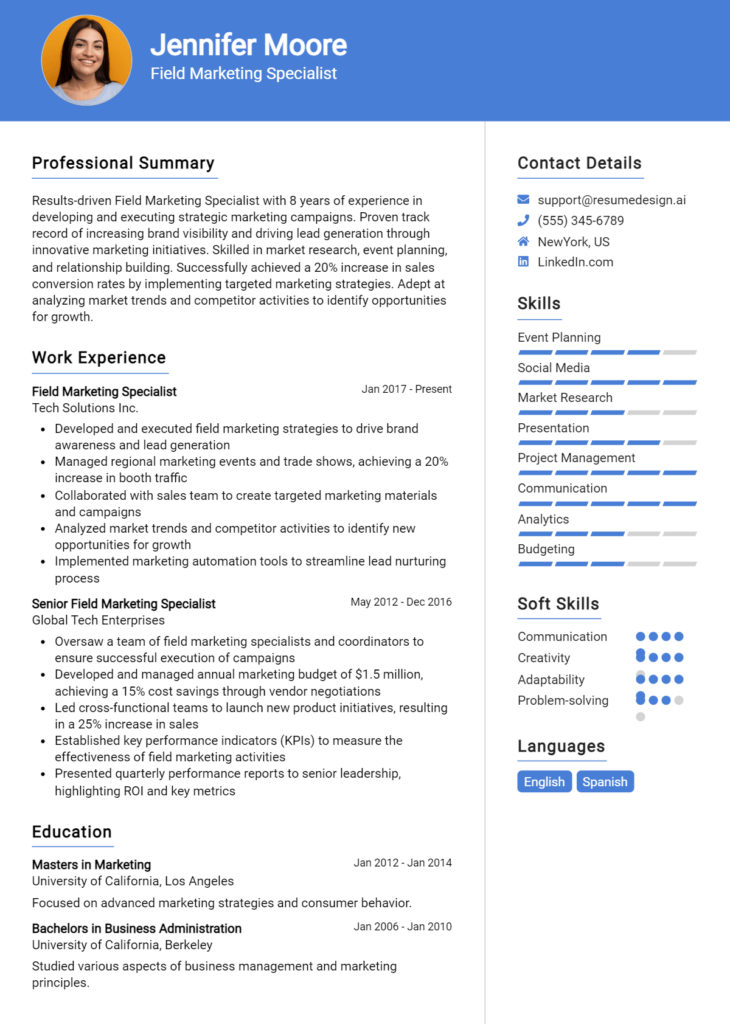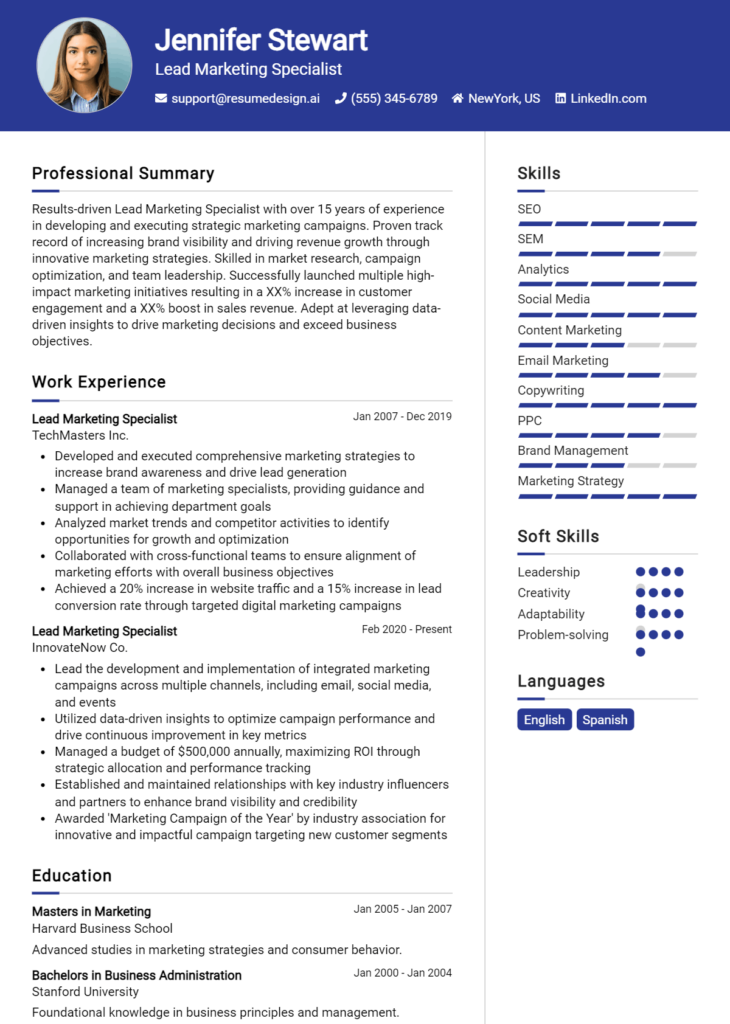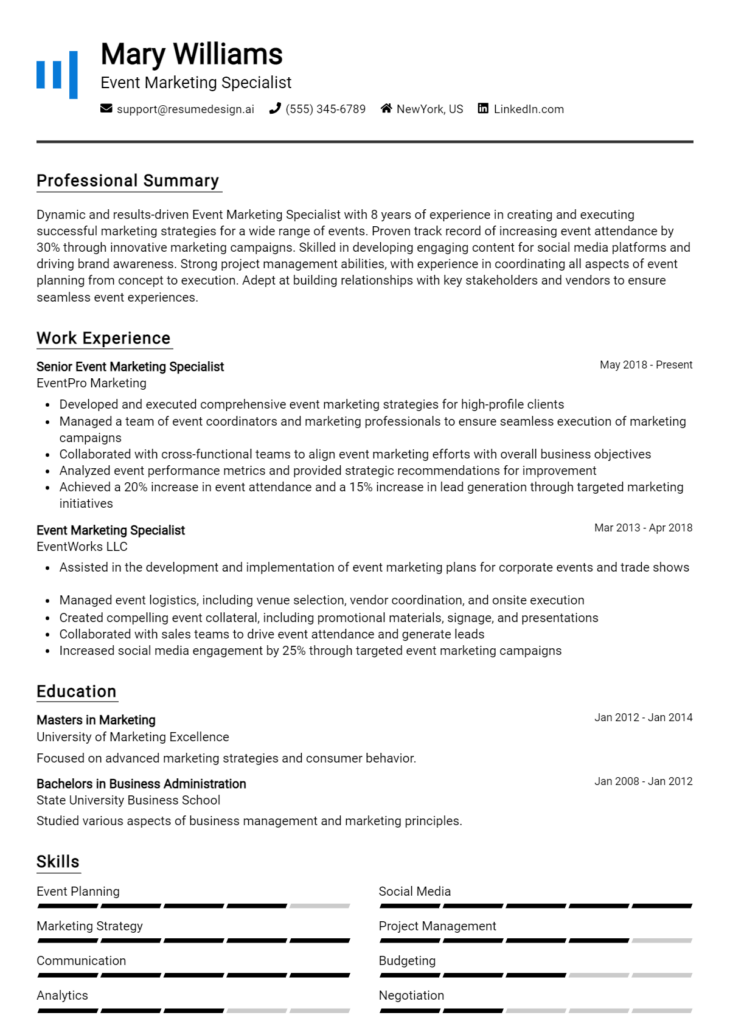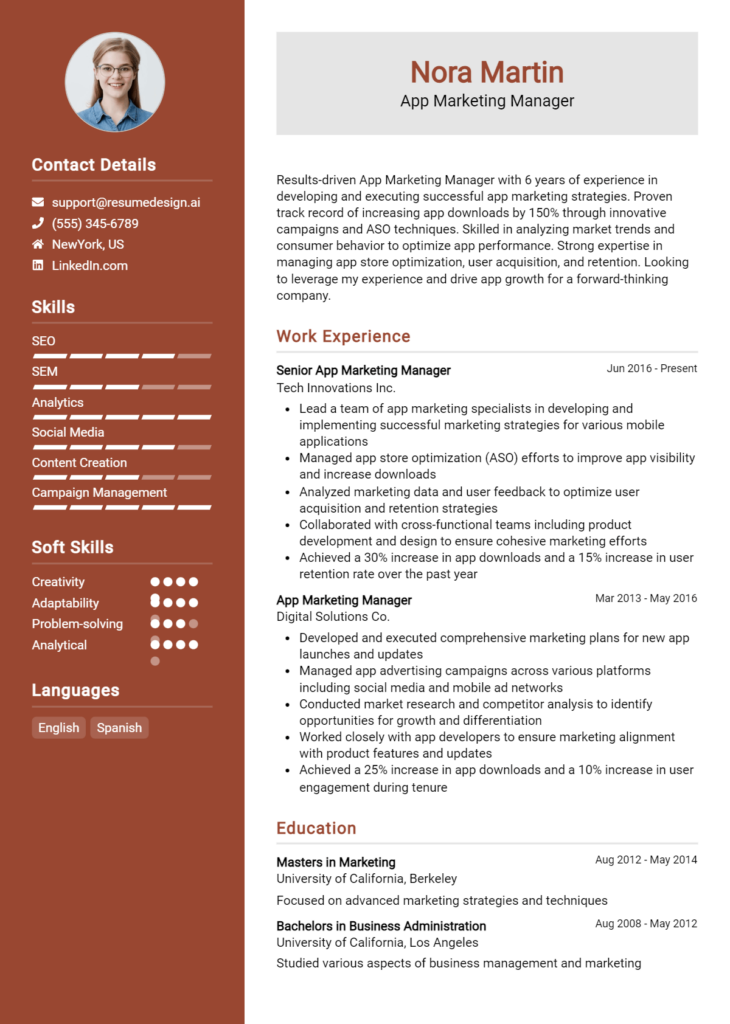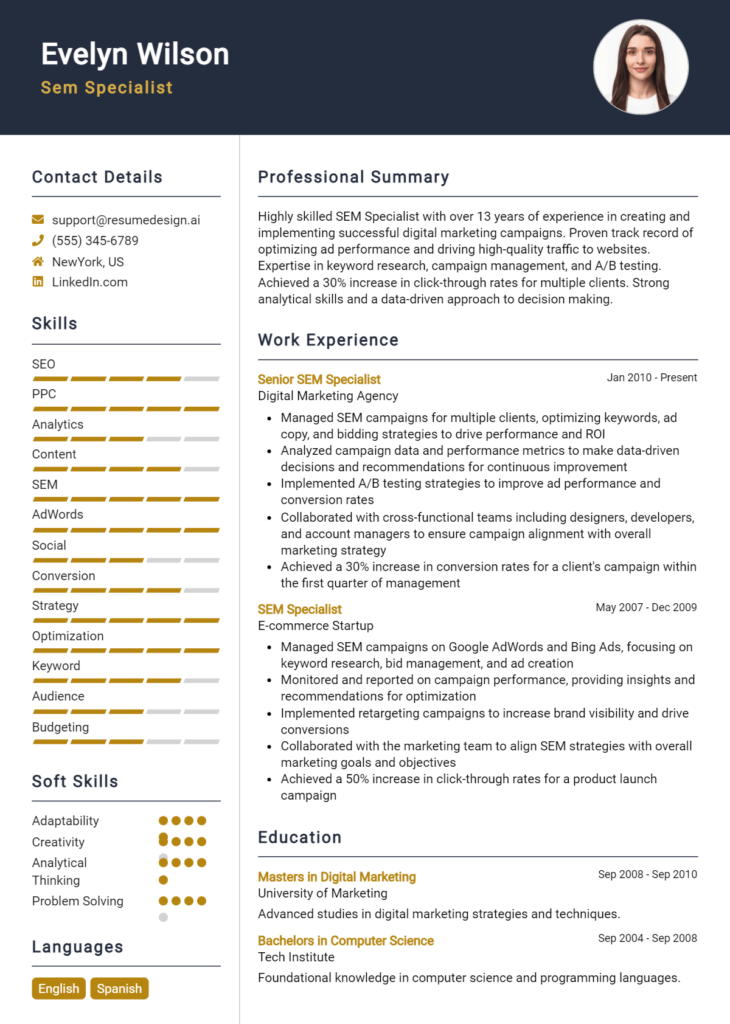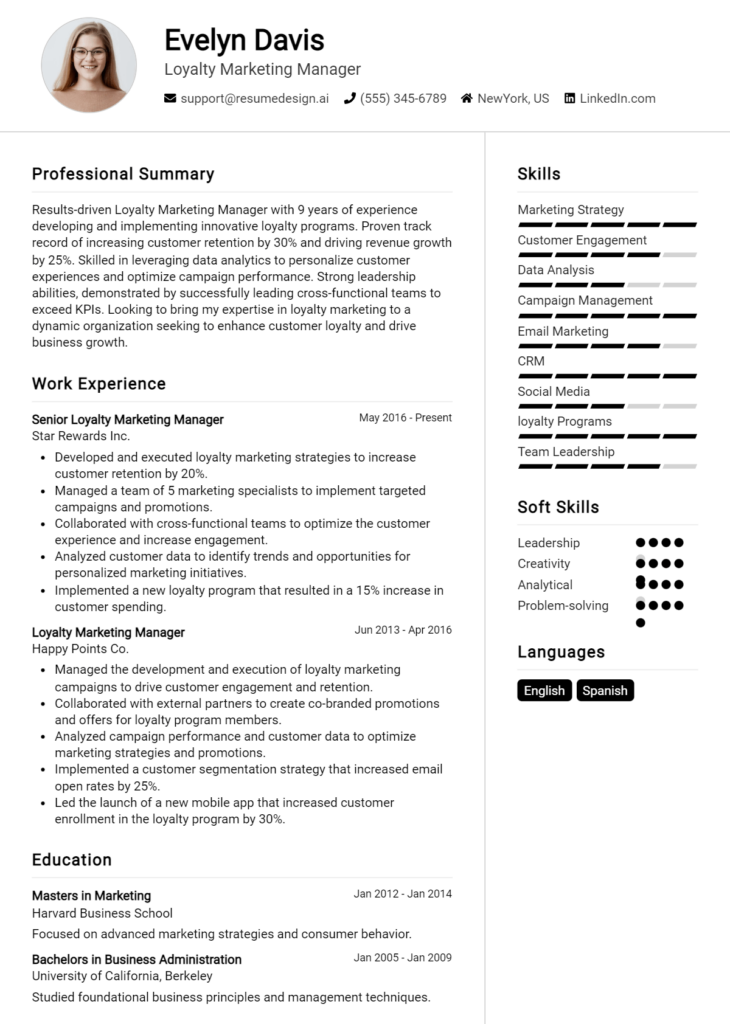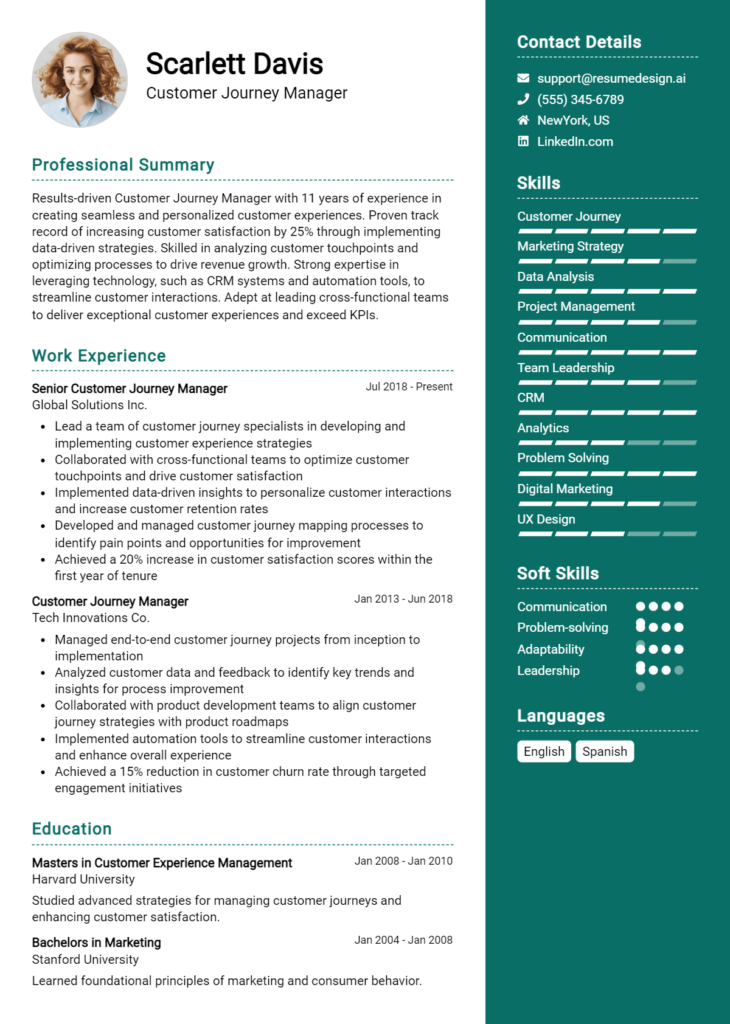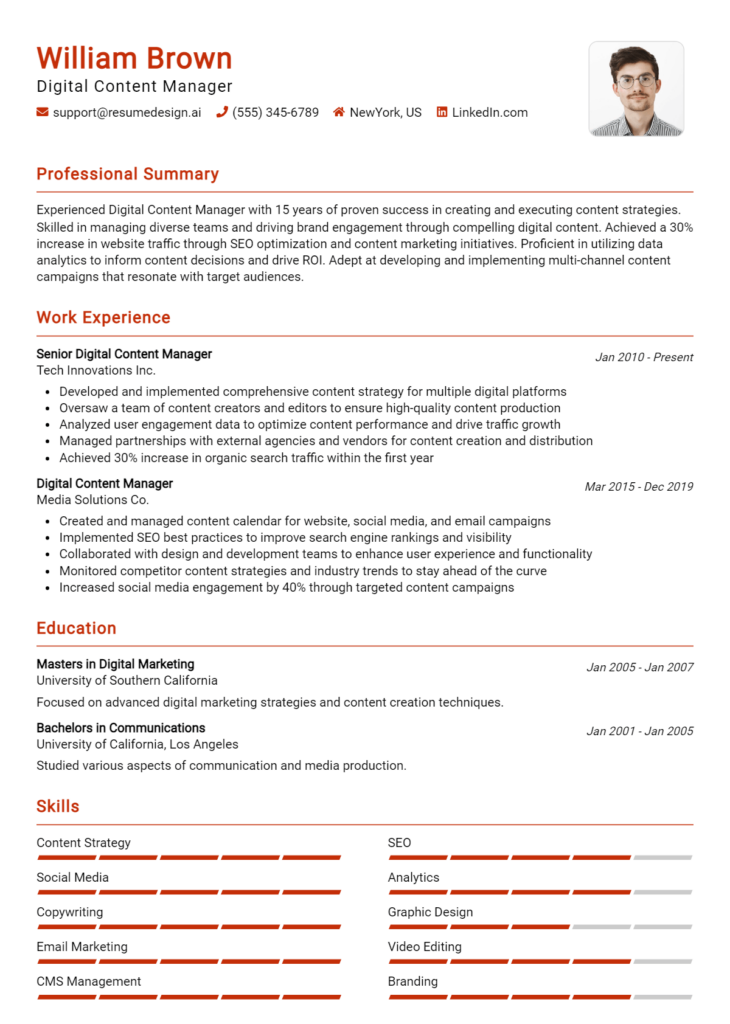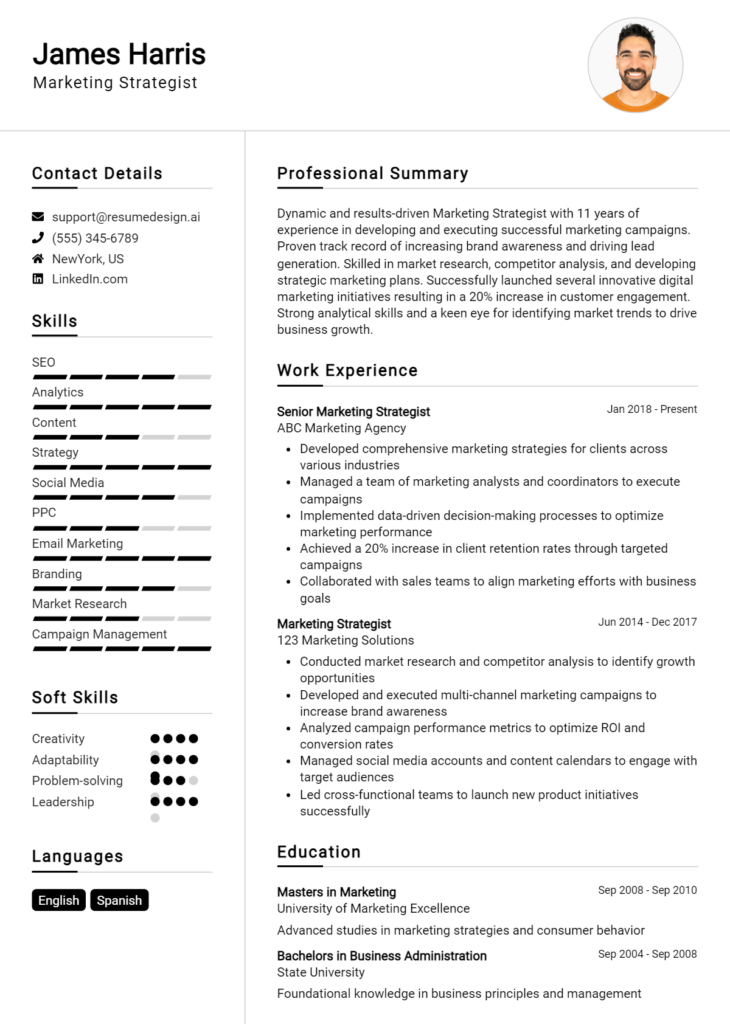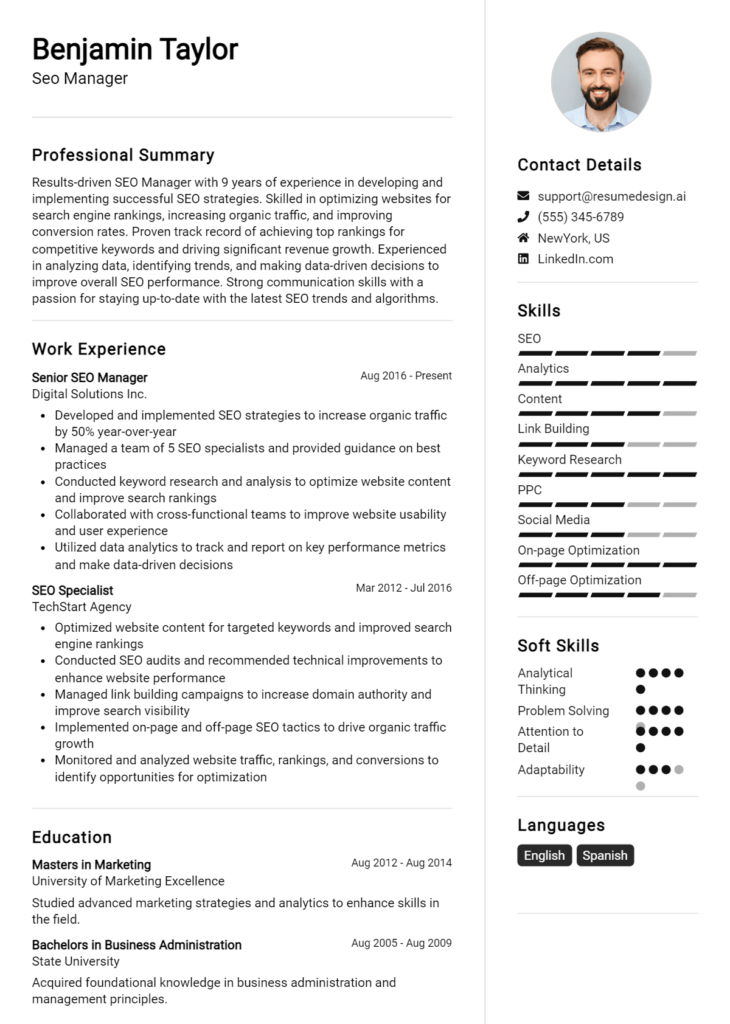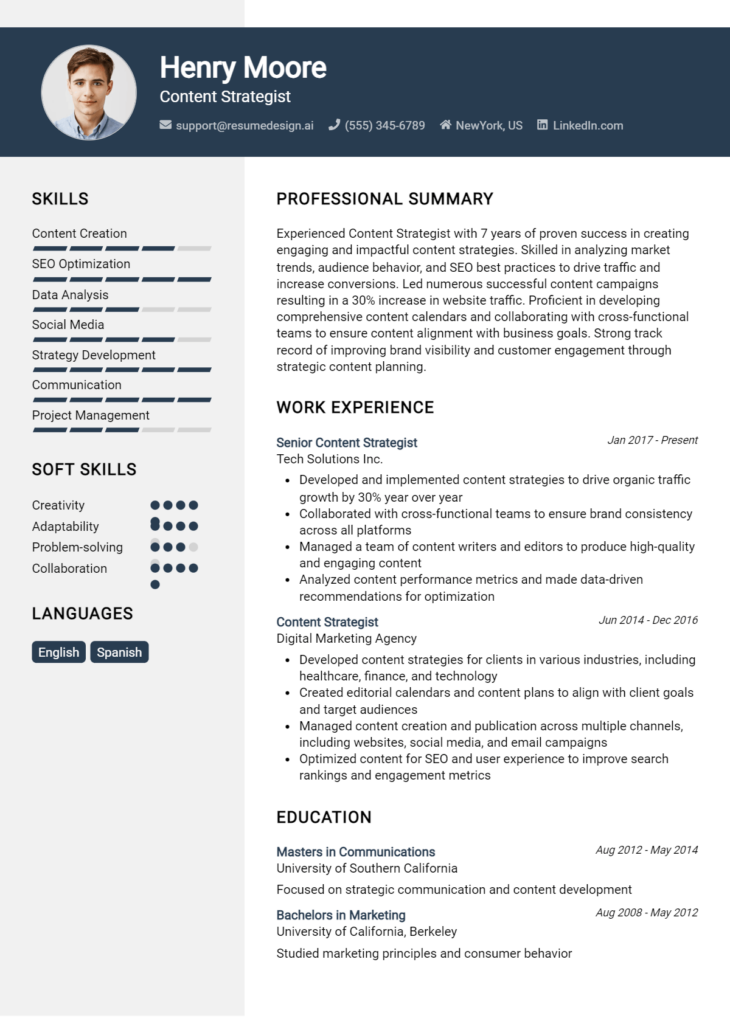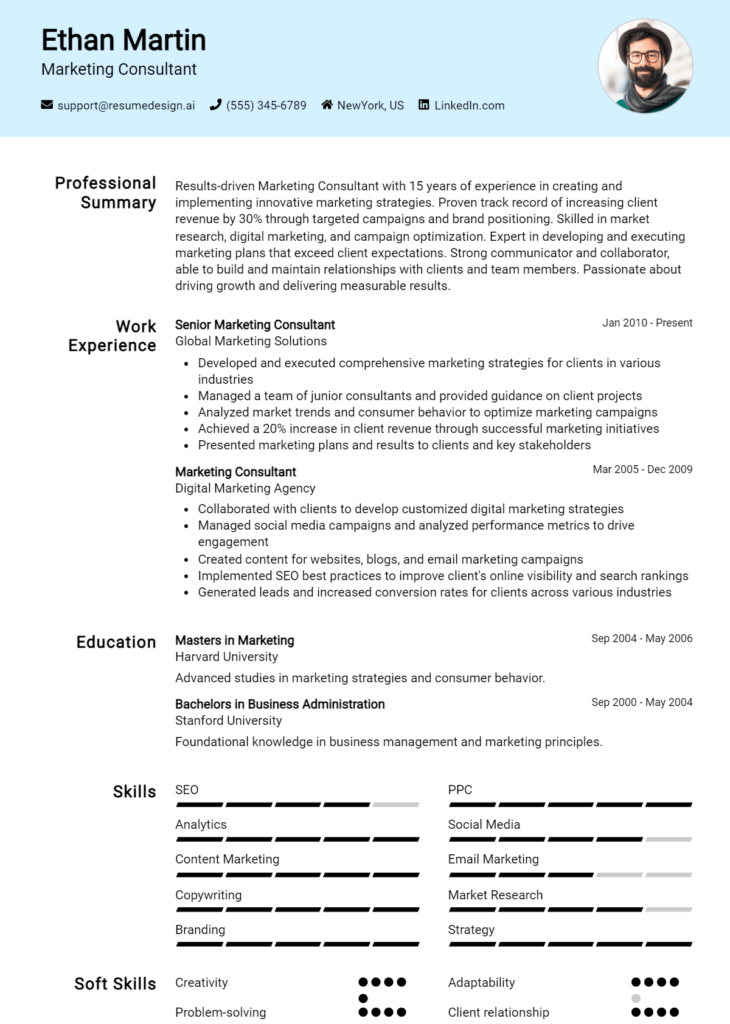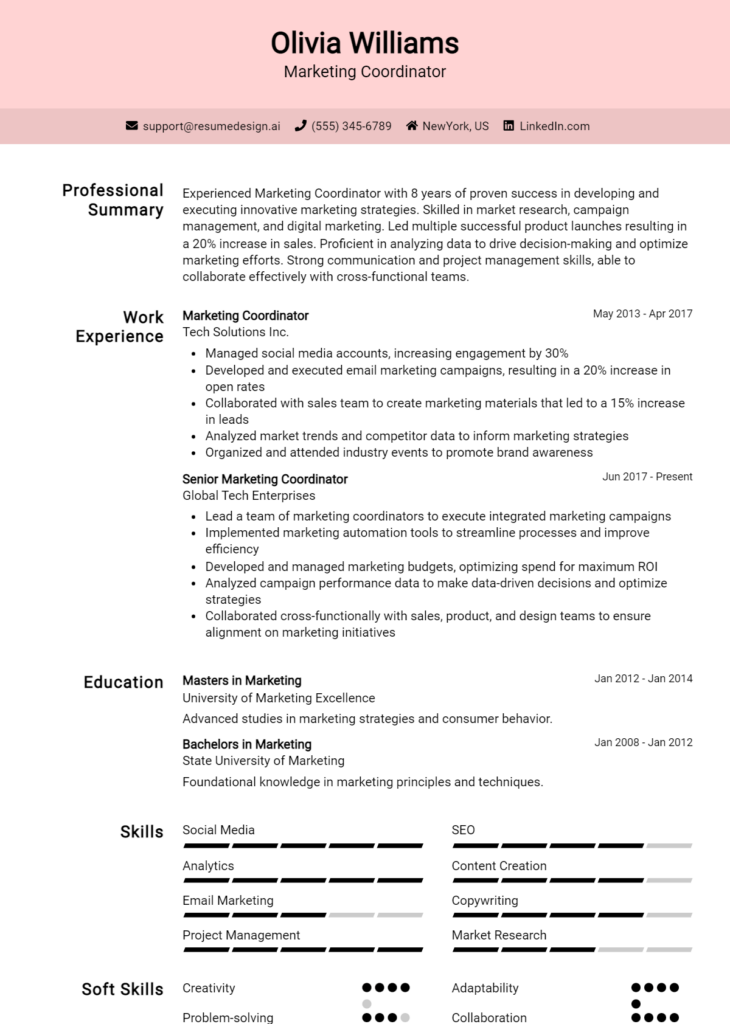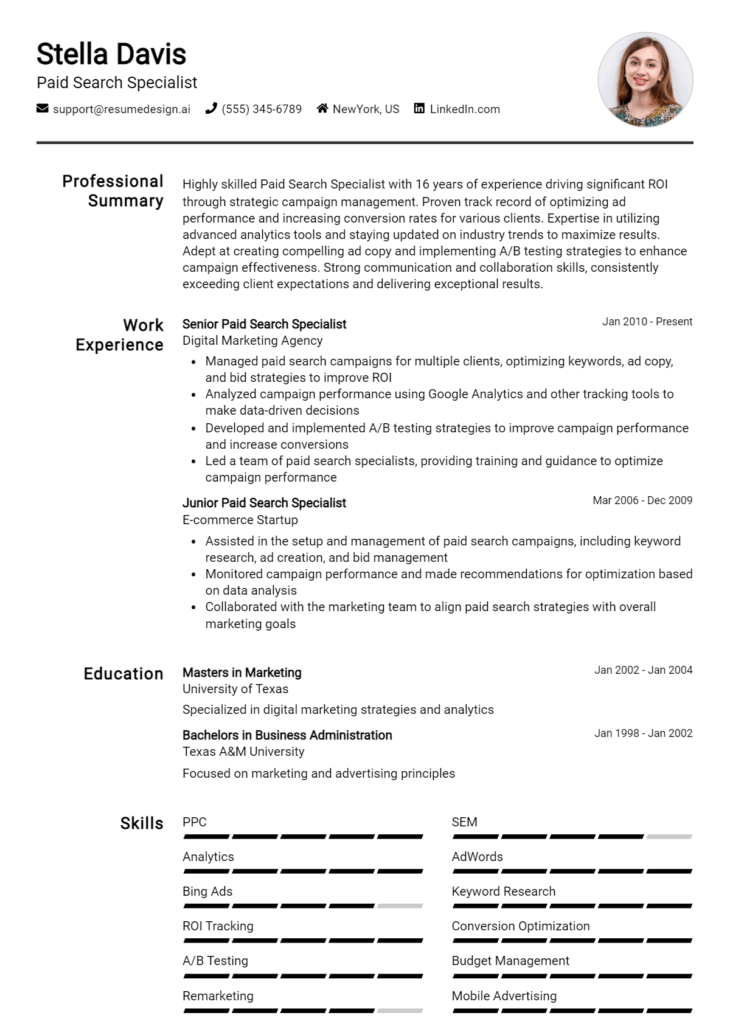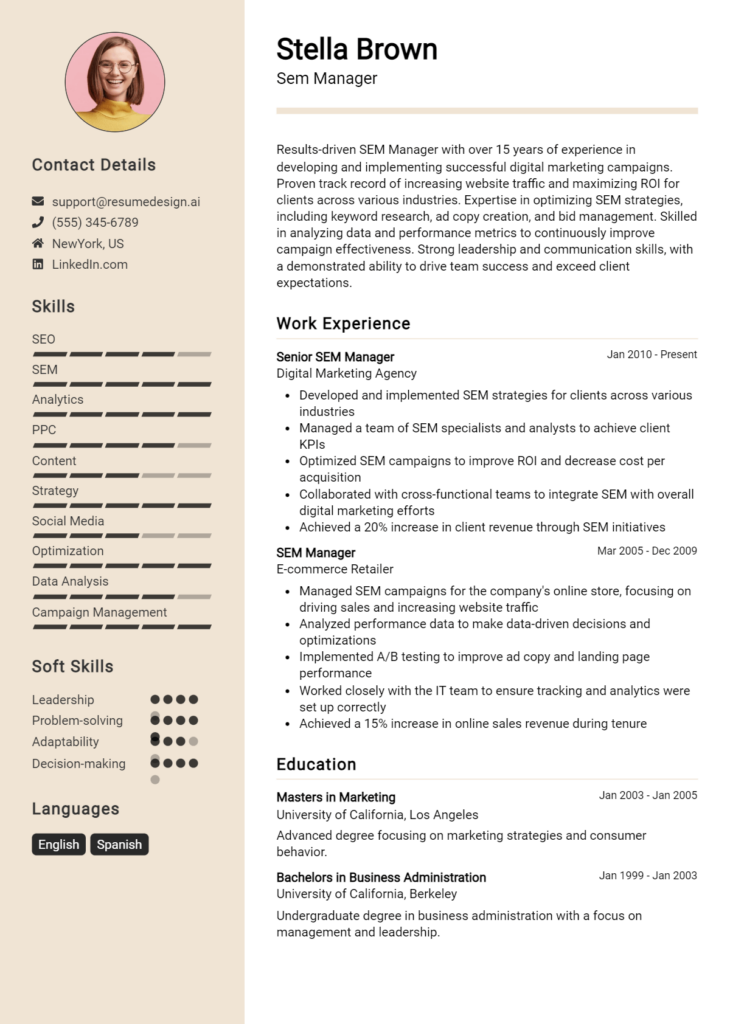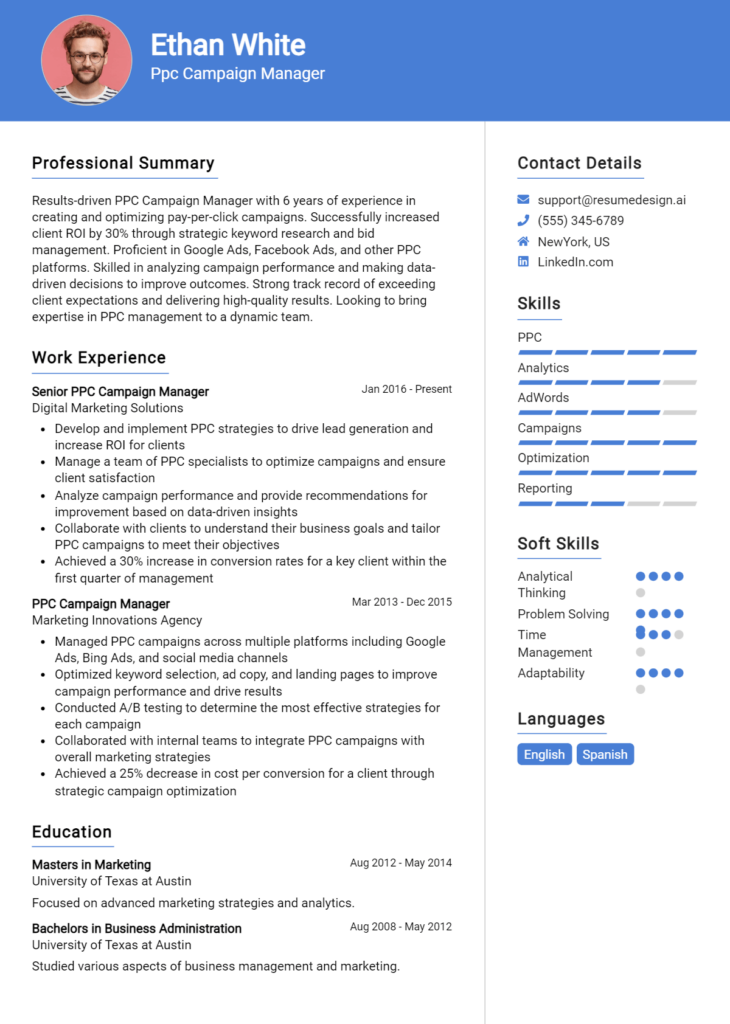Marketing Analyst Core Responsibilities
A Marketing Analyst plays a crucial role in bridging various departments such as marketing, sales, and product development by leveraging data to drive strategic decisions. Key responsibilities include analyzing market trends, conducting competitive analysis, and measuring campaign effectiveness. Essential skills encompass technical proficiency in data analysis tools, operational insight to streamline processes, and strong problem-solving abilities to address challenges. These skills contribute significantly to achieving organizational goals, making a well-structured resume essential to highlight these qualifications effectively.
Common Responsibilities Listed on Marketing Analyst Resume
- Conducting market research to identify trends and opportunities
- Analyzing data to assess campaign performance and ROI
- Creating and presenting reports to stakeholders
- Collaborating with cross-functional teams to develop marketing strategies
- Utilizing analytics tools to track customer behavior
- Performing competitive analysis to inform decision-making
- Developing and maintaining dashboards for data visualization
- Monitoring industry developments and reporting insights
- Assisting in budget management and forecasting
- Recommending strategies for customer segmentation and targeting
- Evaluating the effectiveness of marketing channels
- Participating in product launches and promotional campaigns
High-Level Resume Tips for Marketing Analyst Professionals
In today's competitive job market, a well-crafted resume is essential for Marketing Analyst professionals seeking to stand out to potential employers. Your resume often serves as the first impression you make, and it needs to effectively reflect both your skills and achievements in the field of marketing analysis. A strong resume not only showcases your qualifications but also highlights your understanding of data-driven decision-making and strategic marketing. In this guide, we will provide practical and actionable tips specifically tailored for Marketing Analyst professionals, ensuring your resume captures the attention of hiring managers.
Top Resume Tips for Marketing Analyst Professionals
- Tailor your resume to each job description, emphasizing the skills and experiences that align with the specific requirements of the position.
- Showcase relevant experience, including internships, projects, and roles that demonstrate your expertise in data analysis and marketing strategies.
- Quantify your achievements by including metrics and results, such as percentage increases in campaign performance or revenue growth.
- Highlight industry-specific skills, such as proficiency in analytics tools (e.g., Google Analytics, Tableau) and knowledge of marketing automation software.
- Use action verbs to describe your responsibilities and accomplishments, making your resume more dynamic and engaging.
- Incorporate keywords from the job listing to optimize your resume for Applicant Tracking Systems (ATS) and improve your chances of being noticed.
- Include a professional summary or objective statement at the top of your resume that clearly outlines your career goals and key qualifications.
- Keep your resume concise and focused; aim for one page unless you have extensive experience that warrants additional length.
- Ensure your resume is visually appealing and easy to read, using clear headings, bullet points, and consistent formatting.
- Proofread carefully to eliminate any spelling or grammatical errors, which can detract from your professionalism.
By implementing these tips, you can significantly increase your chances of landing a job in the Marketing Analyst field. A tailored and achievement-focused resume will not only highlight your qualifications but also demonstrate your commitment to the role, ultimately setting you apart from other candidates in the competitive landscape of marketing analysis.
Why Resume Headlines & Titles are Important for Marketing Analyst
In the competitive field of marketing, a Marketing Analyst must present themselves effectively to stand out among numerous candidates. One of the most critical elements of a resume is the headline or title, which serves as the first impression for hiring managers. A strong resume headline can immediately capture attention, succinctly summarizing a candidate's key qualifications and aligning them with the job requirements. It should be concise, relevant, and directly related to the specific position being applied for, ensuring that the candidate’s strengths are highlighted right from the start.
Best Practices for Crafting Resume Headlines for Marketing Analyst
- Keep it concise, ideally under 10 words.
- Use specific job titles that match the position you are applying for.
- Incorporate key skills or areas of expertise relevant to marketing analysis.
- Highlight your years of experience in the industry.
- Use action-oriented language to convey impact.
- Avoid generic terms; be unique and memorable.
- Consider including measurable achievements, if applicable.
- Tailor each headline for the specific job application.
Example Resume Headlines for Marketing Analyst
Strong Resume Headlines
Data-Driven Marketing Analyst with 5+ Years Experience in ROI Optimization
Results-Oriented Marketing Analyst Specializing in Consumer Insights and Market Trends
Strategic Marketing Analyst with Proven Track Record in Campaign Performance Improvement
Weak Resume Headlines
Marketing Analyst Seeking Opportunities
Experienced Professional Looking for a Job
The strong headlines are effective because they are specific, highlight relevant skills, and convey a sense of accomplishment or expertise tailored to the Marketing Analyst role. They immediately inform the hiring manager of the candidate's qualifications and value proposition. In contrast, the weak headlines fail to impress due to their vagueness and lack of specificity; they do not showcase any unique attributes or relevant experience, leaving hiring managers with no compelling reason to consider the candidate further.
Writing an Exceptional Marketing Analyst Resume Summary
A well-crafted resume summary is a crucial element for a Marketing Analyst seeking to make a strong impression on hiring managers. This brief yet impactful statement serves as the candidate's first opportunity to highlight their key skills, relevant experience, and notable accomplishments. A strong summary not only captures attention quickly but also provides a snapshot of how the candidate aligns with the specific requirements of the job. By being concise and tailored to the job description, the summary can effectively set the tone for the entire resume, making it easier for recruiters to identify the candidate as a strong fit for the role.
Best Practices for Writing a Marketing Analyst Resume Summary
- Quantify Achievements: Use numbers and metrics to showcase your impact in previous roles.
- Focus on Relevant Skills: Highlight specific analytical tools, marketing strategies, and techniques relevant to the job.
- Tailor to the Job Description: Customize your summary to reflect the skills and experiences mentioned in the job posting.
- Keep it Concise: Aim for 3-5 sentences that capture the essence of your qualifications without unnecessary fluff.
- Use Action Words: Start sentences with strong verbs to convey confidence and proactivity.
- Showcase Industry Knowledge: Mention familiarity with industry trends, tools, or methodologies that are pertinent to the role.
- Highlight Soft Skills: Include interpersonal skills such as communication and teamwork, which are vital for collaboration in marketing roles.
- Maintain Professional Tone: Keep the language formal yet engaging to reflect professionalism.
Example Marketing Analyst Resume Summaries
Strong Resume Summaries
Results-driven Marketing Analyst with over 5 years of experience in leveraging data analytics to enhance marketing strategies. Successfully increased campaign ROI by 30% through targeted data-driven insights and performance tracking.
Detail-oriented Marketing Analyst skilled in utilizing Google Analytics and SQL to drive actionable insights. Developed a customer segmentation model that improved retention rates by 25%, leading to a $200K increase in annual revenue.
Dynamic Marketing Analyst with expertise in digital marketing and A/B testing. Spearheaded a project that optimized ad spend, resulting in a 40% increase in lead generation within six months.
Weak Resume Summaries
Marketing Analyst with experience in data analysis and marketing. Looking for a job where I can use my skills.
Detail-oriented analyst with a background in marketing. I am seeking opportunities to grow my career.
The strong examples are considered effective because they include quantifiable results, specific skills, and clear relevance to the Marketing Analyst role, demonstrating the candidate's value. In contrast, the weak summaries lack detail and specificity, failing to provide concrete examples or measurable outcomes, making them less compelling to hiring managers.
Work Experience Section for Marketing Analyst Resume
The work experience section of a Marketing Analyst resume is crucial as it serves as a key indicator of the candidate's technical skills, leadership capabilities, and ability to produce high-quality results. This section not only highlights relevant job roles and responsibilities but also quantifies achievements that demonstrate the candidate's effectiveness in real-world scenarios. By aligning work experiences with industry standards and emphasizing metrics, candidates can provide prospective employers with a clear picture of their contributions, making it essential to articulate this section with precision and impact.
Best Practices for Marketing Analyst Work Experience
- Use action verbs to begin bullet points, showcasing proactive contributions.
- Quantify achievements with specific metrics (e.g., percentage increases, revenue growth).
- Highlight technical skills relevant to marketing analytics tools and methodologies.
- Emphasize collaboration by mentioning cross-functional teams and collective goals.
- Align experiences with industry standards to demonstrate relevance and expertise.
- Focus on results-driven narratives that showcase problem-solving abilities.
- Include any leadership roles or initiatives that led to product or process improvements.
- Tailor the work experience to match the job description of the position being applied for.
Example Work Experiences for Marketing Analyst
Strong Experiences
- Led a cross-functional team to implement a new analytics dashboard, resulting in a 30% reduction in reporting time and improved data visibility for stakeholders.
- Conducted market research that identified key customer trends, leading to a successful product launch that generated $500,000 in revenue within the first quarter.
- Utilized SQL and Python to analyze customer data, providing actionable insights that increased customer retention rates by 15% year-over-year.
- Collaborated with the sales team to develop targeted marketing campaigns, achieving a 25% increase in lead conversion rates through data-driven strategies.
Weak Experiences
- Worked on marketing projects that involved data analysis.
- Participated in team meetings to discuss marketing performance.
- Assisted with various tasks related to marketing analytics.
- Conducted research for the marketing department.
The examples categorized as strong experiences demonstrate clear, quantifiable impacts and specific technical skills, showcasing the candidate's ability to lead and contribute effectively to marketing initiatives. In contrast, the weak experiences lack detail and measurable outcomes, making them less compelling to potential employers. Strong experiences convey a sense of ownership and achievement, while weak experiences appear vague and fail to communicate the candidate's true capabilities.
Education and Certifications Section for Marketing Analyst Resume
The education and certifications section of a Marketing Analyst resume plays a crucial role in showcasing the candidate's academic background and professional qualifications. This section not only highlights relevant degrees and coursework but also emphasizes industry-recognized certifications that demonstrate a commitment to continuous learning and skill development. Providing detailed information about specialized training and certifications relevant to marketing analytics can significantly enhance a candidate's credibility, making them more attractive to potential employers who seek individuals equipped with up-to-date knowledge and skills in the ever-evolving marketing landscape.
Best Practices for Marketing Analyst Education and Certifications
- Prioritize relevant degrees in marketing, business, statistics, or data analysis.
- Include industry-recognized certifications such as Google Analytics, HubSpot, or Data Science credentials.
- Highlight specific coursework that aligns with marketing analytics, such as data visualization or consumer behavior.
- Keep descriptions concise but informative, focusing on skills and knowledge gained.
- Showcase any ongoing education efforts, such as workshops or online courses.
- Be clear about the level of education achieved (e.g., bachelor's, master's) and the institution attended.
- Use bullet points for easy readability and to draw attention to key qualifications.
- Tailor the section to each job application by emphasizing the most relevant qualifications.
Example Education and Certifications for Marketing Analyst
Strong Examples
- Bachelor of Science in Marketing, University of XYZ, Graduated May 2021
- Google Analytics Certified, Issued June 2022
- Data Analysis and Visualization Certificate, ABC Institute, Completed March 2023
- Relevant Coursework: Consumer Behavior, Marketing Research, and Statistical Analysis
Weak Examples
- Associate Degree in General Studies, Community College of ABC
- Certification in Basic Office Skills, Issued January 2020
- Master's Degree in an Unrelated Field (e.g., Fine Arts), Graduated December 2019
- Old Certification in Social Media Marketing (expired in 2022)
The examples listed as strong are considered effective because they directly relate to the skills and knowledge required for a Marketing Analyst role, showcasing relevant education and certifications that enhance the candidate's profile. In contrast, the weak examples illustrate qualifications that lack relevance to the marketing analytics field, either due to outdated content or focus on unrelated disciplines, which do not provide value to prospective employers in this specific job market.
Top Skills & Keywords for Marketing Analyst Resume
In the competitive field of marketing, a well-crafted resume is essential for a Marketing Analyst to stand out. Highlighting the right skills can significantly enhance your chances of landing an interview. Employers are on the lookout for a blend of analytical abilities, creative thinking, and effective communication. A strong resume not only showcases your technical proficiencies but also emphasizes your interpersonal skills, which are crucial in collaborating with teams and presenting insights. By focusing on these skills, you can demonstrate your value and adaptability in a constantly evolving marketing landscape.
Top Hard & Soft Skills for Marketing Analyst
Soft Skills
- Analytical Thinking
- Communication Skills
- Problem-Solving
- Team Collaboration
- Attention to Detail
- Adaptability
- Time Management
- Creativity
- Critical Thinking
- Interpersonal Skills
Hard Skills
- Data Analysis
- Marketing Research
- SEO/SEM Knowledge
- Proficiency in Analytics Tools (e.g., Google Analytics, Tableau)
- Statistical Software (e.g., SPSS, R)
- CRM Software Experience
- Excel Proficiency
- Digital Marketing Techniques
- A/B Testing
- Market Segmentation Analysis
For more information on how to effectively showcase your skills and work experience, consider tailoring your resume to highlight these essential competencies.
Stand Out with a Winning Marketing Analyst Cover Letter
Dear [Hiring Manager's Name],
I am excited to apply for the Marketing Analyst position at [Company Name], as advertised on [where you found the job listing]. With a strong background in data analysis, market research, and strategic marketing initiatives, I believe my skills align perfectly with the requirements of this role. My expertise in leveraging data to drive marketing decisions will allow me to contribute significantly to your team and help [Company Name] achieve its marketing objectives.
During my previous role at [Previous Company Name], I successfully conducted comprehensive market analysis that resulted in a 20% increase in customer engagement and a 15% boost in sales over six months. By utilizing tools such as Google Analytics and Tableau, I was able to identify key trends and insights that informed our marketing strategies. I collaborated closely with cross-functional teams to implement targeted campaigns that not only enhanced brand visibility but also improved customer retention. My experience in A/B testing and performance metrics has equipped me with the ability to measure and optimize marketing efforts effectively.
I am particularly drawn to [Company Name] because of your commitment to innovation and excellence in the industry. I admire your recent initiative on [specific project or campaign], which demonstrates a forward-thinking approach to marketing. I am eager to bring my analytical skills and passion for data-driven decision-making to your team, helping to uncover actionable insights that can propel your marketing efforts to new heights.
Thank you for considering my application. I look forward to the opportunity to discuss how my background, skills, and enthusiasms can align with the goals of [Company Name]. I am excited about the possibility of contributing to your team and am available for an interview at your earliest convenience.
Sincerely,
[Your Name]
[Your LinkedIn Profile]
[Your Contact Information]
Common Mistakes to Avoid in a Marketing Analyst Resume
When crafting a resume for a Marketing Analyst position, it's essential to present your skills and experience effectively to stand out in a competitive job market. However, many candidates make common mistakes that can undermine their chances of landing an interview. By avoiding these pitfalls, you can create a more compelling and professional resume that highlights your qualifications and aligns with the expectations of hiring managers in the marketing field.
Neglecting Keywords: Failing to include relevant keywords from the job description can lead to your resume being overlooked by Applicant Tracking Systems (ATS) that screen candidates before human review.
Vague Job Descriptions: Listing responsibilities without quantifiable results or specific achievements can make your experiences seem less impactful. Use metrics to showcase your contributions.
Ignoring Formatting Consistency: Inconsistent formatting can distract hiring managers and make your resume look unprofessional. Ensure that fonts, sizes, and bullet points are uniform throughout the document.
Overloading with Jargon: While industry terminology is important, using excessive jargon can alienate those who may not be familiar with specific terms. Aim for clarity and balance.
Lack of Tailoring: Sending out a generic resume without tailoring it to the specific job or company can be a missed opportunity. Customize your resume to reflect the skills and experiences most relevant to the role.
Omitting Soft Skills: While technical skills are vital for a Marketing Analyst, neglecting to mention soft skills such as communication, teamwork, and problem-solving can leave a gap. These skills are crucial for collaboration and project success.
Including Irrelevant Information: Including unrelated work experience or outdated skills can dilute the focus of your resume. Stick to experiences that highlight your analytical capabilities and marketing knowledge.
Forgetting a Strong Summary: A weak or missing professional summary or objective statement can fail to grab the employer's attention. Start with a strong opening that encapsulates your qualifications and career goals.
Conclusion
As we've explored, the role of a Marketing Analyst is pivotal in today's data-driven landscape. From understanding market trends to leveraging analytics for strategic decisions, a Marketing Analyst bridges the gap between consumers and businesses. Key responsibilities include analyzing data, generating insights, and crafting actionable recommendations that drive marketing strategies. Moreover, successful Marketing Analysts possess strong analytical skills, proficiency in data visualization tools, and an understanding of consumer behavior.
In light of these insights, it's essential to ensure your Marketing Analyst resume effectively showcases your skills and experiences. Take a moment to review your resume and align it with the demands of this dynamic role.
To assist you in this process, consider utilizing a variety of resources available:
- Explore resume templates that can help you create a polished and professional look.
- Use the resume builder for a streamlined experience in crafting your resume.
- Check out resume examples for inspiration and guidance on how to structure your content effectively.
- Don’t forget to enhance your application with a compelling cover letter using cover letter templates.
Take action today to ensure your resume stands out in the competitive field of marketing analysis!

